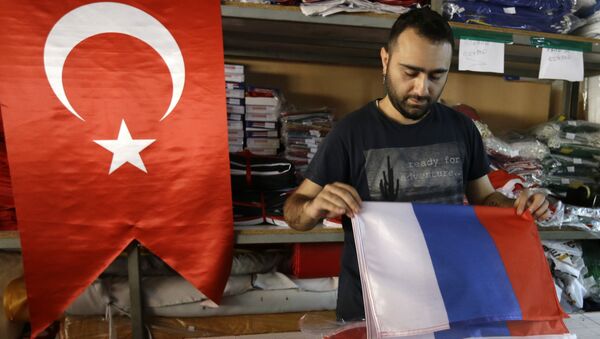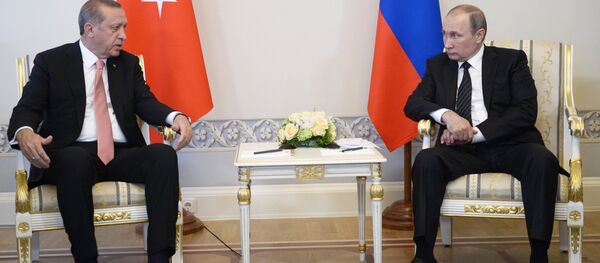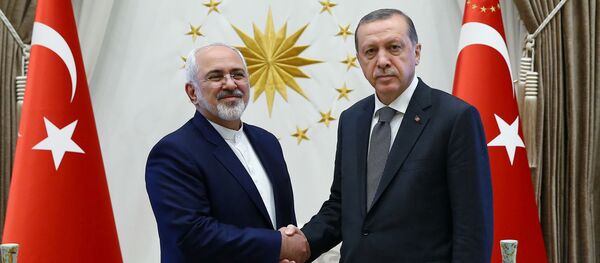Turkey has repeatedly demonstrated its frustration with Brussels and Washington, following the failed coup attempt in the country. Not only has the West failed to lend its helping hand to Ankara during the attempted coup but also lambasted Turkey for the purge which followed the uprising.
The EU-Turkish refugee deal is hanging in the balance, with Brussels yet to grant Turkey with the much anticipated visa free regime in Europe.
Meanwhile, the US is still refusing to extradite infamous Turkish cleric Fethullah Gulen, the alleged mastermind behind the anti-government coup, prompting outrage in Ankara.
In this context the Russo-Turkish rapprochement acquires a new meaning, Russian media outlet Svobodnaya Pressa notes, suggesting that Turkish President Recep Tayyip Erdogan may use its economic, political and military partnership with Russia as a bargaining chip in his negotiations with the West.
For its part the West has already signaled its growing concerns with the Russo-Turkish rapprochement, which it fears could upset NATO's apple cart in Syria.
"Turkey could very likely make concessions to Iran and Russia on Syria. Turkish Foreign Minister Mevlut Cavusoglu has said that no Syrian solution is possible without Russian support and that negotiations on Syria should start with areas of common ground," global intelligence firm Stratfor notes, adding that "Turkey's recent closure of the Bab al-Hawa border crossing, even if temporary, could be a Turkish concession already made to Russia."
The tensions simmering around the Russo-Turkish partnership have prompted Belgian Foreign Minister Didier Reynders to go even so far as to call upon its European counterparts to discuss the rapprochement between Moscow and Ankara at the level of the European Union and NATO.
"So many concerns emerged regarding the relations between Turkey and Russia that it is necessary to hold a discussion on this issue at the EU level, as well as NATO," Reynders told the Radio 1 station.
While Washington's fears are quite understandable, the question arises why Brussels has also begun to beat the war drums.
According to Vadim Trukhachev, Professor of Foreign Regions Chair at Russian State University for Humanities, Turkey and Russia are the EU's largest neighbors.
"The EU's relations with [Russian President] Vladimir Putin and [Turkish President] Erdogan leave a lot to be desired. Since the very beginning the EU's foreign policy has been aimed at preventing the establishment of any blocs and alliances on its borders. No one [in the EU] has rejected the "divide and rule" principle," Trukhachev told Svobodnaya Pressa.
At the same time, the EU-Turkish refugee deal may also have turned into a fiasco with little if any of the provisions actually implemented, Trukhachev suggested.
For his part, CIS-EMO political analyst Stanislav Byshok is sure that the West will take all efforts to prevent further Russo-Turkish rapprochement.
According to the analyst, the European Union and NATO are two considerable parts of what geopolitical observers call "the West." He recalled that back in the 1950s, NATO accepted Turkey as the Alliance's member state not to allow it to side with the USSR.
Byshok noted that it is unlikely that Turkey will leave the Alliance, however, Ankara's charm offensive toward Russia worries the US: if Turkey withdraws from the bloc, Washington will lose its positions both in the Black Sea region and Eastern Mediterranean.
"Moscow is the only geopolitical center in Eurasia which may theoretically form a continental bloc to counterbalance the US. It is the basis of classical geopolitics. Therefore even the slightest move of influential geopolitical players [in Eurasia] in Moscow's direction is perceived by Washington and its allies in Europe as… the beginning of a real Eurasian integration," Byshok told the media outlet.






